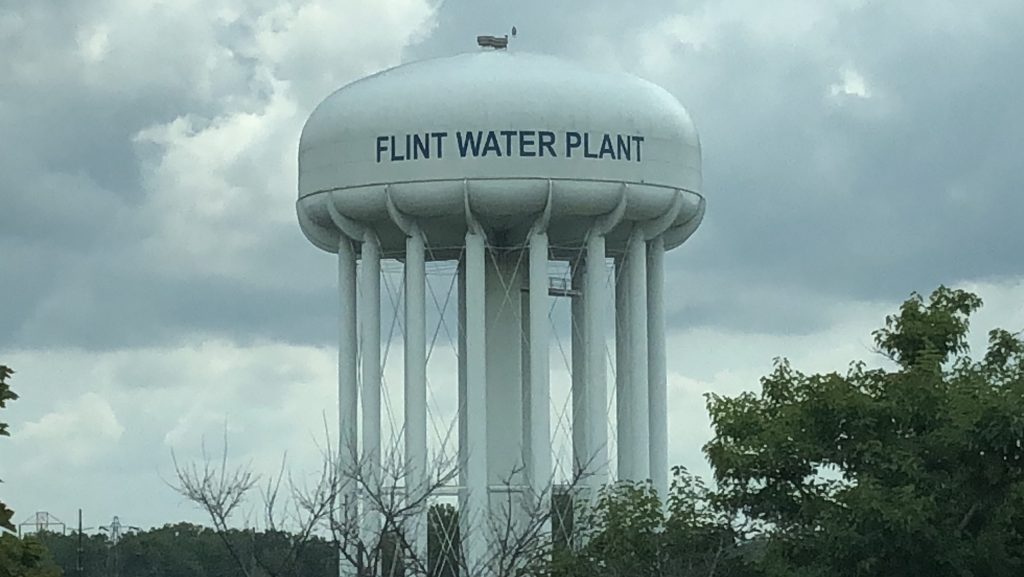Prosecutors Might Be Running Out Of Time To File Charges In Flint Water Crisis
New bills in the state Legislature would give prosecutors more time to charge public officials with misconduct — and not just in Flint.

The Flint Water Plant water tower in Flint, Mich.

April of next year marks the six-year anniversary of the start of the Flint Water Crisis. That’s significant, because state law gives prosecutors six years to charge public officials for misconduct in office.
Recently, prosecutors in Michigan Attorney General Dana Nessel’s office dropped remaining criminal charges related to the crisis in order to start over an investigation they say previous prosecutors botched.
But that also means time is now ticking if they decide to re-file charges against public officials in the case.
Now, Democratic lawmakers from Flint have introduced legislation to extend the statute of limitations for charging public officials with misconduct.
Click on the player above to hear MichMash talk about the effort to extend the amount of time prosecutors have to charge public officials with misconduct.
What the legislation would do
House Bill 4834 and Senate Bill 462 would add four years to the current statute of limitations for filing charges against public officials, including the emergency managers, department leaders, local officials, or others who could have played a role in the Flint water crisis. That means prosecutors would have 10 years from the time the crime was committed to file those charges.
“This legislation is necessary to ensure that the people of Flint have the opportunity for justice to be served and not cut short because the previous investigation was conducted irregularly and ineffectively,” said state Rep. John Cherry (D-Flint), who is sponsoring the House bill. “We need to ensure that investigators have the time needed to properly review the 99 percent of documents that were not turned over to prosecutors until this summer.”
RELATED: Michigan Attorney General Dana Nessel Explains Dropping Charges in Flint Water Crisis Case
The charges that were previously filed against public officials in the Flint Water Crisis included involuntary manslaughter. The attorney general’s office dropped charges against eight public officials, including the former director of the Michigan Department of Health and Human Services, other health department officials, two former Flint emergency managers, local officials, and employees of the Michigan Department of Environmental Quality.
Seven officials had pleaded “no contest” to misdemeanor charges.
Prosecutors could have “extra couple years” even without a law change
Attorney General Dana Nessel recently said on WDET’s Detroit Today with Stephen Henderson that — while this spring marks the six year anniversary of the start of the water crisis — prosecutors won’t necessarily run out of time to file charges as soon as April rolls around.
“It wouldn’t be just that first day, it would be the entirety of the time that was occurring,” said Nessel. “So that, I think, would give them even an extra couple of years, because that took place over the course of quite some time.”
“You can’t take a specific date and say that is the date that the statute tolls,” she continues, “you have to look at a number of different factors and circumstances.”
Nessel is on the other side of her office’s ‘conflict wall’ in the Flint water criminal investigation, which means she’s not handling or involved with the criminal investigation or prosecution of public officials in the case.
This legislation reaches beyond Flint. It could affect your community.
The impetus for the bills introduced in the state Legislature is narrowly focused — to extend the period prosecutors have to charge officials responsible for the Flint Water Crisis.
But the language of the proposed law is much broader. It would affect any public official in Michigan who could be charges with misconduct while in office.
That means these bills, while tailored to Flint’s situation, could also affect your community and the entire state.
